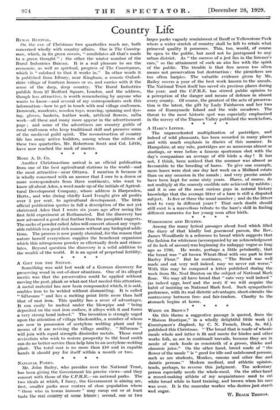Mr. John Bailey, who presides over the National Trust, has
been giving the Government his precise views—and they consort with those of the C.P.R.E.—on national parks. The two ideals at which, I fancy, the Government is aiming are, first, smaller parks near centres of close population where " those who in towns immure " may camp out or at least taste the real country at some leisure ; second, one or two larger parks vaguely reminiscent of Banff or Yellowstone Park where a wider stretch of country shall be left to retain what primeval quality it possesses. This, too, would, of course be open to the public, but need not be juxtaposed to any urban district. As " the success of a jest lies in the listener's ears," so the attainment of such an aim lies with the spirit of the public. The trouble is that free access too often means not preservation but destruction : the picnickers are too often harpies. The valuable evidence given by Mr. Bailey covers a year of the best work known to the annals. The National Trust itself has saved six precious places during the year; and the C.P.R.E. has stirred public opinion to a perception of the danger and means of defence in almost every county. Of course, the greatest of the acts of preserva- tion is the latest, the gift by Lady Fairhaven and her two sons of Runnymede Island and the wide meadows. The threat to the most historic spot was especially emphasized in the survey of the Thames Valley published the week before.
































 Previous page
Previous page